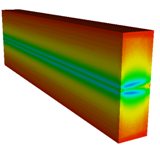Speaker
Markus BRUGGER
(CERN)
Description
A rigorous campaign of benchmark measurements for materials typically used at accelerators
has shown the high accuracy of FLUKA calculations for isotope production and residual dose rates.
Accurate estimates of both quantities are important during all phases of an accelerator, i.e., design, operation and decommissioning.
A detailed implementation of geometries and accurate consideration of loss assumptions allows optimizing the layout of components
and performing detailed intervention planning starting already efficiently during the design phase.
Recent design modifications have shown the need to derive practical scaling coefficients in order to quickly asses
how estimated results can be roughly scaled for different assumptions affecting the calculated quantities, e.g.: chosen materials;
beam energies and particles; loss conditions, cooling times and beam impact parameters.
This talk gives an overview of dedicated generic simulations and the comparison of residual dose rates
for different chosen representative configurations.
Furthermore, the major contributing isotopes are derived
and obtained results are compared to those of dedicated simulations (TDI, IR7 collimators, etc).
Co-authors: ROESLER Stefan (CERN), FORKEL-WIRTH Doris (CERN)
